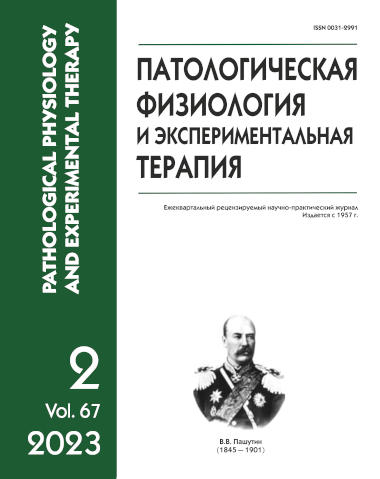Role of F2, F5, FGB, and PAI-1 gene polymorphisms in changes of hemostasis in patients with COVID-19-associated lung injury
Abstract
The aim of this work was to study the association between hemostasis and related genetic polymorphisms in patients with COVID-19-associated lung injury depending on its severity. Methods. The study included 53 patients with COVID-19 divided into two groups based on the severity of lung injury: with injury up to 50% of the lung parenchyma (n = 22) and with injury more than 50% (n = 24). The control group consisted of sex- and age-matched practically healthy individuals (n = 15). Before the start of therapy, all subjects were assessed for prothrombin time, activated partial thromboplastin time, thrombin time, blood concentrations of fibrinogen and D-dimer, XII-dependent fibrinolysis, and antithrombin activity. Polymorphisms rs1799963 of the F2 gene, rs6025 of the F5 gene, rs1800790 of the FGB gene, and rs1799889 of the PAI-1 gene were determined by polymerase chain reaction. Data were analyzed with the IBM SPSS Statistics v. 23 application software package. Results. In patients with moderate and severe COVID-19-associated lung injury, activation of coagulation hemostasis was observed, which was due to external and common pathways, slower XII-dependent fibrinolysis, and reduced antithrombin activity compared to healthy individuals. Procoagulant changes were significantly more pronounced. in the group of patients with severe disease, who had a characteristic increase in the frequency of mutant alleles of the F2 gene rs179996 polymorphism compared to the control, decreased frequency of non-mutant homozygotes, and increased frequency of heterozygotes. The frequency of occurrence of pathological mutations rs6025 in the F5 gene, rs1800790 in the FGB gene, rs1799889 in the PAI-1 gene did not significantly change. A weak inverse correlation was found between the heterozygous GA variant of the F2 gene rs179996 polymorphism and the prothrombin time in moderate disease, and a moderately strong inverse correlation in severe disease with more than 50% lung injury. There was no significant correlation between parameters of hemostasis and polymorphisms rs6025 in the F5 gene, rs1800790 in the FGB gene, and rs1799889 in the PAI-1 gene.






